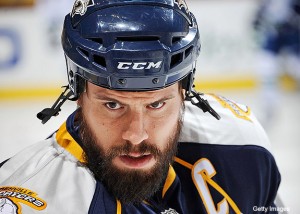Last week, the Philadelphia Flyers made a monster offer sheet to restricted free agent Shea Weber for 14 years and $110 million. After a week of speculation of will they or won’t they, the Nashville Predators decided to match the offer sheet, which means Weber will stay with the only team he has known through his entire NHL career. After losing unrestricted free agent Ryan Suter to the Minnesota Wild, the idea of losing both players in one offseason was too much. To find out what the signing of Weber means for the Predators future, continue after the jump.
One of the big reasons that many thought Nashville wouldn’t match was the highly front loaded nature of the contract. It will pay Weber two $13 million bonuses within the next calendar year, and a $1 million base salary in the first year of the contract. The fact that a small market team has to pay one player $27 million in the next 365 days was thought to be too much for the Predators. But the idea of losing both franchise players within weeks of each other was too much for Nashville management to bear. Losing both players would have set the organization back years, and might have eventually doomed a team who struggles to make money, and draw fans from places other than Tennessee. The Flyers, who are in search of a new defensive leader due to Chris Pronger’s post concussion problems, had hoped this big money would scare off the Predators.
Even Jared Bosquett, seemed to be in the mindset that Nashville couldn’t match the offer sheet. Bosquett spoke on TSN Radio last week about Weber saying that “He’d like to play with the Philadelphia Flyers because we all feel that he’s just another piece in the puzzle to take them to the next level. He doesn’t want to go through a rebuilding process again.” and “I don’t think you sign an offer sheet unless you’re pointing in that one direction.” These comments sound like the agent, and possibly player, didn’t think he’d be back in Nashville. While there may be some fences that need to be mended, the amount of money being paid should help solve those problems. The Weber contract is the second largest signed in NHL history, behind the 13 year, $124 million deal signed by Alex Ovechkin in 2008. The cap hit for Weber will be $7,857,143 over the length of the deal.
By resigning Weber, and inking goalie Pekka Rinne to a contract during the season, the Predators were able to keep two of the three key players who were up for free agency this offseason. While losing Suter to the Wild hurt’s, it’s not as bad as losing all the strength of their blueline at once. By keeping Weber, the team’s captain, in Smashville, the Predators look to continue their arc upwards in the NHL. After winning their first playoff series in team history this past postseason, the Predators appeared to be on the verge of something big. However, such a large contract could become an albatross to a franchise that doesn’t exactly make money like the league’s premier teams. With their play on the ice, and the matching of this offer sheet, Nashville is making a push towards a true hockey market, and is one of the few Sun Belt teams actually having success in the NHL.
The only question left in Nashville this offseason will be whether hockey will actually be played this season. The bonuses must be paid whether games are played or not. The owners want to save themselves from these types of contracts, and apparently want the players to help. This offer sheet showed the huge void between the haves and have-nots of the NHL. Philadelphia tried to poach one of the best players in the league by trying to price out a small market team on an absurdly long contract. These types of moves are what owners say is the problem with the league right now, yet they continue to give them out every year. These types of moves could lead to another lockout this season, as the owners essentially want the players to save them from themselves, despite record revenues of more than $3 billion this past season.
The owners are definitely making money, and after signing this contract so will Shea Weber. The only question is when he will play next. Will it be the normal start of the season? December? In time for the Winter Classic? Or perhaps not even until 2013-14 season? Whether there are games or not, Weber will still get paid. And fortunately for Predators fans, his employer is still Nashville.
Bryan Vickroy has an addiction to hockey, and is willing to partake in all its forms. He is skating extra shifts for The Sports Bank, covering the Minnesota Wild, the NHL, and NCAA hockey all year long. Look for new articles throughout the week. He can be followed on Twitter at @bryanvickroy. If you’d prefer to speak in more than 140 characters at a time to him, he can be reached at bryan.vickroy@gmail.com.


